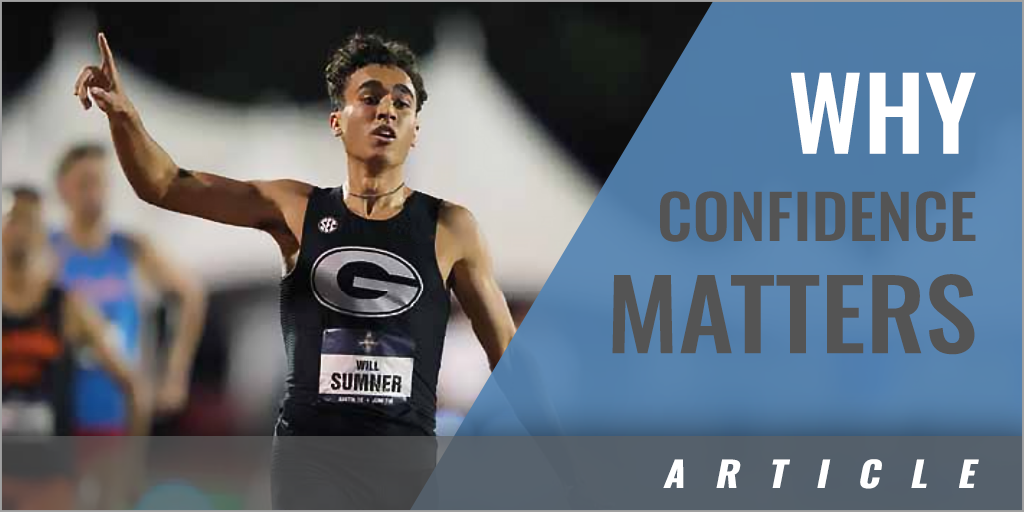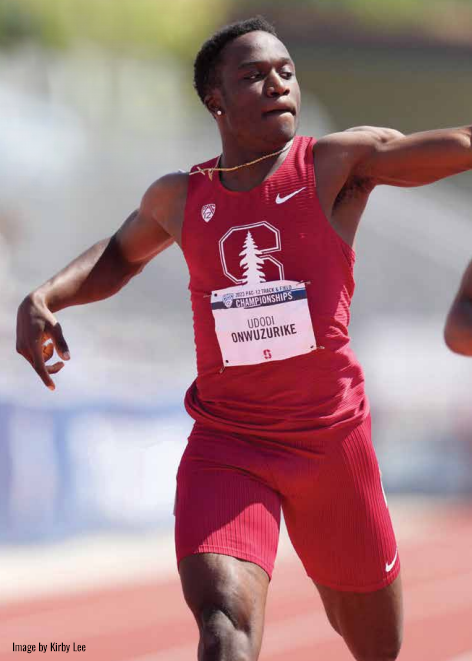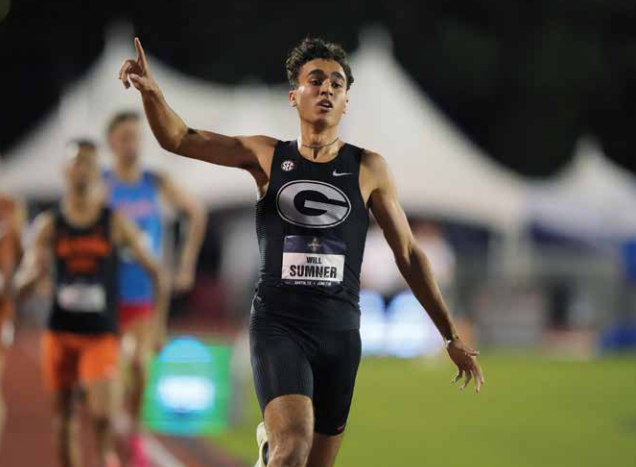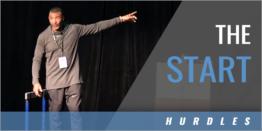|
By: Mike Thorson, Former Director of Track & Field/Cross Country - University of Mary (ND) Originally Published in: Techniques Magazine Provided by: USTFCCCA Most coaches would say they have had an athlete who possessed loads of talent, but underachieved due to psychological and mental issues, and, more specifically, a lack of self-confidence. Or how about this one? We have all heard it. A coach will say they should have gotten a degree in sport psychology so they could sufficiently do their job and deal more effectively with many of their athletes. There is no question that mental skills training has risen to the forefront in the last several years. How important is this type of training? Ralph Mann, a former world class track and field athlete and a very noted sport biomechanist, in his book entitled, "The Mechanics of Sprinting and Hurdling," says this: "The mental aspect of an athlete is probably the most misunderstood, underestimated, and underdeveloped area of all the limiting performer related factors in sprinting and hurdling." Dr. Mann's statement is hardly restricted to sprinters and hurdlers. It could certainly apply to all sports, and most certainly to all the events of track and field.
The definition of self-confidence is the sureness of feeling that you are equal to the task at hand, and therefore believe you can perform a specific behavior successfully. It sounds relatively simple, but experience reveals that it is complex and there are many layers to why some athletes have more than enough self-confidence to perform at the highest levels and others don't. Most coaches will agree that the most important skill that assists in success is self-confidence. How important? Helen Keller, the famous American author, disability rights advocate, political activist, and lecturer who lost her sight and hearing when she was 19 months old, said it best: "Optimism is the faith that leads to achievement. Nothing can be done without hope and confidence." And a little closer to home: "If you don't have confidence, you'll always find a way not to win," boldly stated Carl Lewis, an American track and field icon who won nine Olympic gold medals. You will even find the importance of confidence in the bible. Hebrews 10:35: "So do not throw away your confidence; it will be richly rewarded." Obviously, self-confidence is a very individual inner trait. Most will agree it is relatively easy to pick out athletes who possess great confidence and can step up and meet nearly any and all challenges. It is pretty simple, too, to identify the athletes that lack self-confidence. As Confucius said, "The man who thinks he can and the man who thinks he can't are both right." These athletes who lack self-confidence are the ones that present a huge and oftentimes frustrating challenge to coaches. Most programs do not have the luxury of having a mental performance coach. Thus, the objective of this presentation is two-fold: 1. To explore how the coach can foster greater self- confidence in the already confident athlete, and increase and improve self confidence in the athlete who lacks that very important ingredient. 2. To assist the coach in understanding the causes and issues surrounding the lack of confidence in athletes. It will be approached from a number of different perspectives and present viewpoints from both the coach and the athlete. The topic certainly reveals that while there is a tremendous amount of science involved in coaching, there is truly an art to masterful coaching. An extensive survey of both coaches and athletes (some present and some former) was done to seek answers about how coaches could fuel or improve self confidence in athletes. The survey contained a series of questions for both coaches and athletes pertaining to this all-important matter. This article will examine the responses and summarize the common threads and patterns that emerged. Each section will include insights, strategies, thoughts and ideas by the various coaches and athletes. Three questions were posed to athletes and four to coaches, and we will delve into the answers, question by question, and organize the presentation into the seven different sections. Please note that the names of the current athletes who responded have been withheld. SECTION 1: It is only fitting that we start with the numerous sources of a lack of confidence in the athlete. The first question that was submitted to current and former athletes: What can cause you as an athlete the most stress, anxiety, and lack of self-confidence prior to a competition? There were a number of prevalent issues that athletes found to contribute to self-confidence issues: #The overwhelming response among current and former athletes was a lack of preparation. "A lack of preparation would be the number one factor that causes stress, anxiety and a lack of confidence," said Cindy (Leingang) Thompson, a former national champion and six-time All American from the University of Mary. "The most anxiety-inducing thing prior to competing would include not feeling prepared for the demands of competition physically, mentally and emotionally," noted Marceau Jovin, a Canadian hurdler who was a place winner in the 110-meter hurdles for his home country. Coaching legend John Wooden, the "Wizard of Westwood" who won 10 NCAA basketball championships in 12 years at UCLA, summed it up best: "Confidence comes from being prepared. Hall of Fame coaching legend Dan Pfaff takes it a step further when he says, "Prepare with precision...leave no stone unturned." Good advice indeed for all coaches and athletes. #Many of the athletes mentioned training issues, which obviously are directly related to preparation. "An injury or injuries can cause a substantial lack of confidence," remarked Maria (Bolibruch) Meyer, a former conference champion hurdler from the University of Mary. "The results will not be what the athlete could produce and lead to self-doubt," she added, referring to the injured athlete. Even something like a poor pre-meet warmup could affect self-confidence. "Not having the proper warmup or pre meet can make me doubt my abilities and get in my head," said a current athlete. #The coach not believing in the athlete or not being invested in them was also high on the list. "The athlete will certainly not be as invested," said one current athlete, "if the coach doesn't care about the outcome." "A coach believing in the athlete can relieve many feelings of stress, anxiety and self-doubt," declared Meyer. One former Mary athlete alluded to the importance of coaches allowing athletes to make mistakes, fail and rebound, and grow from the experience. "Teaching athletes to remain positive and come back from failure and disappointment is a very important concept," according to Mandy (Schroeder) Sheldon, a four-time national champion, 11-time All American from the University of Mary and a member of the NAIA Hall of Fame. "Athletes need to be empowered over their performances and own both success and failure," added Sheldon. "Coaches can greatly help in that respect," she noted. #Another issue athletes noted was focusing on negative factors and the athlete concerning themselves with things they cannot control. A fear of failure was also mentioned by many of the athletes as a leading cause of self-doubt leading to a lack of self-confidence. "I hyper-fixate on what could go wrong in my race instead of thinking about all the things that could go right," expressed a current athlete. That statement prompts a quote from Robert Schuller, an American Christian televangelist, pastor, author and motivational speaker who was known for the television show, "The Hour of Power": "It takes but one positive thought when given a chance to survive and thrive and overpower an entire army of negative thoughts." #The final category athletes mentioned as causing issues with self-confidence prior to a competition was outside factors such as relationships, family, scholarships or school issues. All of these can lead to the athlete to not being able to "focus" on the things they need to and creating doubts and mental barriers. SECTION 2: The second question, which was posed to coaches, directly related to the first question and read: Thinking back to your time as an athlete, what caused you the most stress, anxiety and a lack of confidence prior to a competition? It was interesting, although there were several new items mentioned, coaches had nearly all the same thoughts as current and former athletes regarding this topic. #Although preparation problems were high on the list for the coaches, the factor that they listed as the most problem-causing for confidence was a fear of failure and not being able to please their coach. "My own expectations and fear of failure," stated Julia Hammerschmidt, a German athlete who is the sprint/hurdle coach at Bismarck State College (ND) and who also coached at Chadron State (NE). "I hated losing or embarrassing myself," added the former All American hurdler at the University of Mary. "I had a fear that I wasn't good enough...that I didn't belong," revealed Jeremy Schroeder, the boys track and field coach at Bismarck High School (ND) who was an All American triple jumper at Minot State University (ND). Kenny McDaniel, the director of track and field/cross country at Sacramento State, said, "As an athlete I struggled with pleasing my coaches and I always wanted them to be proud of my performances. "When I failed to please my coaches, it caused distress and self-doubt." Danylle Kurywchak, an All American triple jumper who graduated from Baylor University and who is now the jumps coach at the IMG Academy in Florida added, "My best motivator was knowing that my coach loved to coach me." #Preparation, or lack of, was a large element tabbed by coaches. Cale Korbelik, the men's and women's track coach at the University of Mary, summed it up very distinctly: "It all came down to preparation for me. It caused me a lot of stress if I wasn't progressing in training." #Like the athletes, the coaches also said things they couldn't control were confidence busters. "I put way too much focus on variables I couldn't control," said Mike Silbernagel, the head strength and conditioning coach at the University of Mary and a former collegiate football standout and award winning power lifter. "When and how we were traveling, eating, etc.," he added. "Things that I had no control over." #Communication problems and goal setting deficiencies were also mentioned. "One-sided communication using fear and intimidation was an issue," noted Eric Hanenberger, the associate track and field coach at South Dakota State University. "I would have benefited from focusing on specific goals instead of getting caught up in the 'big picture' and end result," said Amelia (Maher) Sherman, a standout combined events athlete from the University of Duluth (MN) who had several coaching stops, including Mary and High Point in North Carolina. SECTION 3: Question three correlated with confidence problems and it was expressed to athletes (current and former) as follows: How can a coach contribute to a lack of self confidence in you as an athlete? #The number one issue athletes named that contributes to self-confidence difficulties was a coach who did not listen and who failed to develop a relationship with the athlete. The athletes said they lacked trust and belief in the coach when no relationships were developed. Most people would agree that you are shaped by your relationships, and that communication and relationships go hand in hand. "It is not motivating at all when an athlete lacks a relationship with a coach," explained one current athlete. Former Rhode Island high school standout Maria (Bolibruch) Meyer, mentioned earlier, added, "It certainly relieves feelings of self-doubt, stress and anxiety if the coach believes in the athlete." "Coaches that do not listen when the athlete has legitimate concerns or issues can create an environment of self-doubt and distrust for the athlete, "echoed Marceau Jovin, former Toronto, Ontario (Canada) club track and field standout who competed at the University of Mary.
#The second item that many athletes mentioned was coaches who were overly negative, critical and found fault tirelessly with little or no positivity. "Endless hounding on mistakes and being constantly negative does absolutely no good," expressed Mandy (Schroeder) Scheldon, a one-time MVP at the NAIA national championships and a standout at Mary after transferring from Kansas. "My coaches didn't over praise, but getting the praise that I did certainly boosted my confidence." One current athlete added this: "Criticizing every mistake and only providing negative feedback with no positive is a real downer for confidence." #Other items that athletes vocalized included too high of expectations, lack of consistency and structure in the training plans, or many changes to the training plan. Several current athletes noted that constantly changing training plans created a lot of doubts. Another athlete said a constant change in training caused severe doubts about the training and the coach. A current athlete also remarked that having far too high of expectations always made her feel like she was failing. SECTION 4: The same question was posed to the coaches: How can a coach contribute or cause a lack of confidence in an athlete? The coaches were adamant that negativity, overcorrecting and not allowing the athlete to fail were large factors in hampering the athlete's confidence. #Dennis Newell, the cross country coach at North Dakota State University and many time coach of the year in a long career at the University of Mary, had this to say on the subject: "A coach that doesn't have a plan, that doesn't have consistency, that has unrealistic expectations, never produces objective results, and never gives positive affirmation is a recipe for deteriorating a student-athlete's self-confidence. Student-athletes need to be molded and nurtured by design through intelligent planning, consistency, challenging and realistic expectations, objective results, and positive affirmation. I often say my job is to 'create opportunity to grow towards opportunity to achieve.' A systematic and periodized program will lead to progression for the student-athletes to achieve by not only changing them bio-mechanically and physiologically, but also emotionally and psychologically." Carl Caughell, an assistant coach at Sacramento State University (CA), had a simpler answer: "Negativity and over corrections," he noted. Mankato State University (MN) coach Chris Parno added to Coach Caughell's comment: "There are certainly times when we need to be critical of athletes, but it should always come from a constructive lens." The highly successful coach and numerous national assistant coach of the year also noted, "Consistent communication, always working to reduce stress for the athlete, and being a calming presence for the athlete are other factors." SECTION 5: Question 5 was asked of the coaches: Thinking back to your career as an athlete, how or what did coaches do to create self confidence in you? The coaches surveyed felt very strongly, recalling that the best confidence building coaches were the ones who stressed proper preparation, were honest, and cared for and had a belief in them. #Proper Preparation. "My coaches had a belief in my capabilities and prepared me to believe I could handle anything that was thrown at me, " said Mary coach Mike Silbernagel, who was a standout collegiate athlete at Valley City State University (ND). Former collegiate hurdler Carl Caughell had basically the same thoughts: "As an athlete my coach emphasized the importance of preparation. He simply built your confidence on the fact that you had did everything in your power to prepare for the moment." Dennis Newell, a many- time All American at Black Hills State University (SD) who had Scott Walkingshaw as a coach, had this to say about preparation: "My self-confidence was directly affected by my ability to feel prepared for the desired task. I appreciated controllability and repeatability. My coach was meticulous in his planning and preparation with our training design and was very thorough with educating me on those designs. This gave me a tremendous amount of self-confidence." #Belief, caring, understanding and honesty were traits that stood out to the coaches as important. Former longtime Mary jumps coach Jeremy Schroeder, a former Minot State University standout who competed for Coach Dave Zittleman noted that, "My coaches cared about me and not just about winning. They gave me space and gave me room to fail." "Being honest about expectations was very helpful," said Julia Hammerschmidt, an All American hurdler/ sprinter at the University of Mary. "The expectations were high, but they were realistic." SECTION 6: This was a very basic question directed to both current and former athletes: How or what can a coach do to create self-confidence in you as an athlete? Respondents to the question touched on a number of different components that a coach or mentor can employ to encourage self- confidence. The major ones included relationships, proper preparation and training, honesty and positivity. #Relationships (Communication, Care, Trust). A current athlete summed up very well what nearly all the athletes spoke about: "As a student-athlete, a coach that builds a relationship with you is the one that will help you succeed. I have been blessed with coaches that care not only about how fast I can run on the track, but my personal development. A coach should start by building trust with their athletes. That requires the coach to be supportive and attentive to their athletes. An athlete needs to feel the coach's presence in their personal life as well as athletics. A coach that lacks holistic coaching has a difficult time relating to their athletes on an intimate level. Trust does not just happen. It is earned. Confidence plays a key role in an athlete's desired achievements. An athlete that does not have their coach's full attention will struggle with self-confidence. It is easier to believe in yourself when your coach has faith in you." Cindy (Leingang) Thompson, a collegiate national champion in the pentathlon at the University of Mary after transferring from Illinois State, put it very clearly: "The true sign of a great coach, great teacher or leader is to connect with the athlete." A current athlete added a very simple thought about caring: "It has helped me to gain confidence because my coaches care about me as a person first and as an athlete second." #Training and Preparation. Many athletes brought up training, feeling it can be a major player in leading an athlete to greater confidence. "Having a training plan that consistently breeds success over a long period of time is very reassuring and certainly helps confidence," said one current athlete. #Positivity, Faith and Honesty. A former national champion exclaimed, "An athlete will always believe in themselves if their coach believes in them." She added, "Positive behavior on the part of the coach has an immense impact on the athlete's psychological state." SECTION 7: The final query was for coaches: What methods or factors can a coach use to build and foster self-confidence in an athlete? #Many of the coaches acknowledged that they use many of the traditional sport psychology modalities. They included: (1.) Goal setting. (2.) Breathing exercises and routines. (3.) Mental imagery. (4.) Visualization. (5.) Self talk. (6.) Coping skills. (7.) Mental resilience training. #Coaches listed many items that could be utilized in the improvement of self-confidence. They included (1.) Positive reinforcement and feedback. (2.) Positive team culture. (3.) Treating every athlete as an individual. (4.) Developing consistency and success in training, leading to more and more success. (5.) Proper preparation. (6.) Belief in the athlete. #The overwhelming factor that nearly all coaches listed to improve and develop self-confidence was building relationships with the athlete and communicating effectively. Reece Vega, the sprint/hurdle coach at North Dakota State University, said the relationship issue boils down to whether the coach falls into the category of being a transactional coach, or a transformational one. Vega explained: "Transformational coaches want to make a lasting impression that will last a lifetime. The transactional coach thinks more about the present moment, the immediate result, and not how they can benefit the athlete beyond their career. My guess is athletes who have poor relationships with coaches and suffer low self-confidence are often coached by transactional coaches." Coach Vega also cited the huge difference coaches can have in the lives of athletes, pointing to the famous quote: "A coach will impact more people in a year than the average person in a lifetime." Troy Thorson, the West Fargo Sheyenne High School (ND cross country) mentor who coached Bowerman award winner Laura Roesler of Oregon when she competed for Fargo South High School (ND), had an interesting take on how he has changed perspectives on relationships and belief in athletes: "I have definitely evolved in this area from where I began coaching to where I am at now in my career. As a new coach, I focused on trying to build confidence through workouts/training. I have moved towards more of an individual approach with my athletes. I put a lot of energy into getting to know what motivates young people and developing a relationship with them built around trust and communication. Having these conversations builds trust and gives the athlete ownership. I really like this motto when dealing with athletes: 'Athletes trust coaches, coaches trust athletes.' Trust people, not processes. When you have an athlete that knows that their coach believes in them, you have a powerful confidence- builder right there!" #To close this section, we have enclosed a plan by the always prepared and very detailed cross country/distance coach, Dennis Newell from North Dakota State University, to develop self-confidence, It is a five-pronged approach: PREPARATION CONSISTENCY EXPECTATIONS EVIDENCE-BASED RESULTS POSITIVE AFFIRMATION SUMMARY There were many common themes that rose to the top in this presentation. There was main major consensus, however, that both coaches and athletes agreed upon: The coach is a major player in the development and improvement of self-confidence in the athlete. REFERENCES Mann, Ralph, The Mechanics of Sprinting and Hurdling, 2018 Pfaff, Dan, Altis, Articles, Clinics A special thanks to Ann Thorson and Amelia Sherman for editing and technical assistance. |








